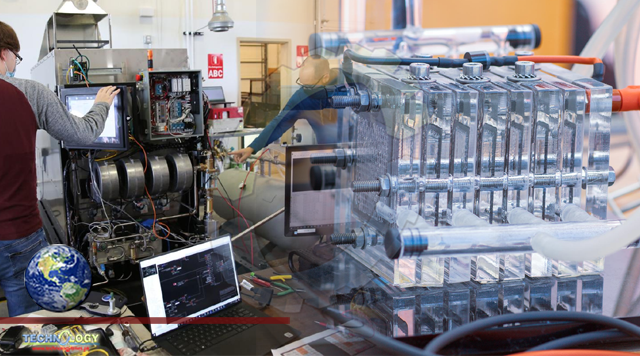After more than a decade, the pair are ready to market their hydrogen fuel cells technology, which can power ships, trains and stationary applications like cellular networks, data centers and hospitals that rely upon a steady supply of power.

By SUZANNE ROIG
Element 1 founders Robert Schluter and Dave Edlund know a lot about hydrogen gas — and the Bend entrepreneurs are about to share that with the world.
After more than a decade, the pair are ready to market their hydrogen fuel cells technology, which can power ships, trains and stationary applications like cellular networks, data centers and hospitals that rely upon a steady supply of power. The technology uses methanol to create hydrogen through a process that avoids the need for large tanks to store hydrogen, which is a clean source of energy.
“It’s really cool,” said Schluter. “The fuel cell produces electricity by using hydrogen. It’s cost-effective and only produces electricity, so it’s very clean.”
And it’s much lower in cost because the fuel cell generator technology can produce a kilowatt of hydrogen for $3 to $4, whereas a kilowatt of hydrogen can go for as much as $16.
Element 1 was founded in 2010 and has now turned into a firm employing about 18 people developing and selling advanced hydrogen generation technology from its Bend headquarters on Plateau Drive and tapping into young talent at Oregon State University-Cascades. It’s exactly the kind of company that spurs economic diversity in the Central Oregon economy, said Roger Lee, Economic Development for Central Oregon CEO.
“That’s what is promising about Element 1,” Lee said. “It’s the talent. It’s easy for us to say ‘look at this company, they know the industry and they’re on to something.’ It’s a natural for economic development for us.”
In March the company signed a letter of intent with Ardmore Shipping Corp. and Maritime Partners LLC to deliver the company’s technology that turns methanol-to-hydrogen technology to the marine sector.
The company’s hydrogen purification technology converts methanol and water liquid feedstock — very dense in hydrogen molecules — into pure fuel-cell grade hydrogen by using heat, pressure and catalysts.
When Josh Tibbits, an Element 1 engineer, joined the company seven years ago, he was a fresh-faced 34-year-old college graduate in the OSU-Cascades Energy Systems Engineering program, which was created by the college to fill a niche need.
He got his job through a connection he had made with Schluter, who was visiting to talk as a guest lecturer about energy storage.
“He encouraged us to talk to him, and that was a few months before graduation,” Tibbits said. “And then I heard they were hiring. The rest is history.
“That contact was everything, especially if you want to stay in Bend.”
Rebecca Webb, OSU-Cascades senior instructor in engineering degree programs, said the program was designed to address the energy challenges facing the planet. Many of the hires at Element 1 are former students.
“Partnerships like this one are very symbiotic,” Webb said in an email. “We work together to shape a curriculum that aligns with industry needs, the companies sponsor capstone projects and internships, give guest lectures and hire our graduates.”
For Bend, a business like Element 1 supports the city’s green jobs initiative, said Ben Hemson, Bend business advocate.
“Element 1 is a business that looks to the future by developing new technology,” Hemson said. “We have a long list of businesses that have succeeded that are looking to the future. These businesses are forward-thinking and growing.”
Lee, of Economic Development for Central Oregon, said Element 1 is among the best examples of partnerships OSU-Cascades has with companies creating economic diversity.
“It’s a good example of the university listening to the marketplace here of where the opportunity is. Element 1 can benefit from this program at OSU-Cascades because it can employ local people and attract others from the rest of the country.”
Element 1 began when Edlund, a new graduate of the University of Oregon, was hired by Bend Research (now Lonza) to create the technology. Edlund, also the co-founder of Bend fuel-cell manufacturer IdaTech, met Schluter, a neighbor with years of business development experience.
Schluter says the business model employed by Element 1 is to develop the technology and get it ready for commercial use then license others to manufacturer the product. Already, the company’s fuel-cell technology is being employed by a Changchun, China trucking firm.
“As long as there’s methanol in the fuel tank, we’re using renewable methanol, “Schluter said. “It’s starting to become available on the marketplace. It’s really clean versus diesel and gas. Our technology produces zero pollution. No black soot. No smog. No tailpipe emissions.
“But it does produce CO2, and that’s a greenhouse gas.”
Other companies also build hydrogen fuel cells, but what Element 1 offers is the technology piece of the puzzle to achieve the full potential.
“It’s taken us 10 years to make the technology marketable,” he said. “Now the economics of fuel cells is where the action is, and that’s where we got traction.”
Originally published at The bend bulletin